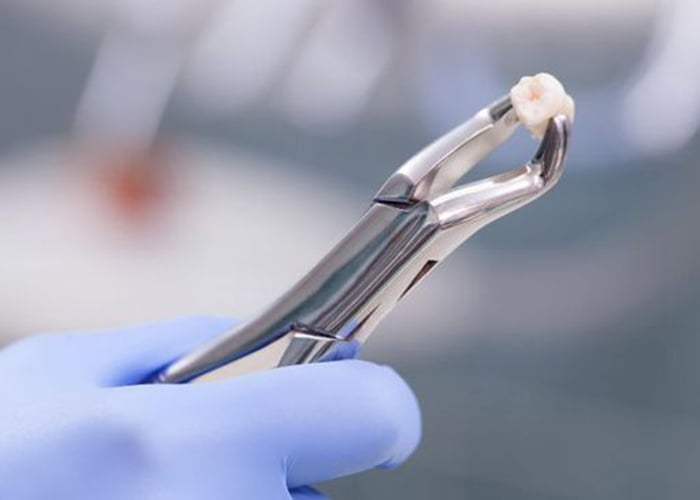Tooth extraction is a common dental procedure, however, it can be stressful for patients who are afraid or have anxiety about going to the dentist. We’re here to help you make the process simpler. Some find tooth extraction preparation a little overwhelming which is why it is best to know all you can before you head to your procedure.
There are many reasons that you might need a tooth removed. If you have any alignment issues (orthodontic) or you are suffering from dental trauma or you might need to have teeth removed to make room for dentures or Impacted wisdom teeth which cause problems like pain, tooth decay, gum disease and also affect other teeth. In such cases, a tooth extraction treatment is better to avoid long-term problems.

There is nothing to worry about prior to or post the tooth extraction procedure if you keep the below tips in mind.
1. Talk to your dentist about your fears and concerns. They can help put you at ease and explain the procedure in more detail.
If you’re one of the many people who experience anxiety or fear at the dentist, you’re not alone. Do not hesitate in asking as many questions as you want even if it is something that you think may sound silly.
Dental anxiety is a common problem, and it’s important to talk to your dentist about your fears and concerns. There are a number of things that can cause dental anxiety, from fear of pain to worry about the cost of treatment. They can help you find ways to cope with your anxiety and make sure you’re comfortable during your appointment.
2. Share Medical History
Patients who are afraid or anxious about their upcoming dental appointment may not want to disclose their full medical history to their dentist. However, it is necessary to do so in order to ensure a smooth and successful tooth removal process. Dental anxiety is a real thing, and patients should feel comfortable discussing their fears and concerns with their dental care team. There is no need to be embarrassed or ashamed – we are here to help you! We will work with you to ensure that you are as comfortable as possible during your appointment, and we will do everything we can to minimize any pain or discomfort you may experience.
Be thorough about the information related to:
- Bacterial endocarditis
- Congenital heart defect
- Mechanical or biomechanical heart valves
- Liver disease
- Artificial joint replacements
- Impaired immune system
Discussing your medical history with the dentist will help prevent any complications.
3. Distract yourself during the procedure by listening to music or watching a TV show.
Bring a pair of earbuds and music player (or phone) to your dental appointment. This can help take your mind off of what’s happening and make the time go by more quickly. If you’re worried about pain, be sure to communicate with your dentist beforehand so they can help make your experience as comfortable as possible. Remember, there’s nothing to be afraid of and you’re in good hands!
4. Take deep breaths and try to stay calm. The more relaxed you are, the less pain you will feel.
If you’re one of the millions of Americans who suffer from dental anxiety, you may be all too familiar with the feeling of your heart racing as you sit in the dentist’s chair.
Take some deep breaths and try to stay calm. The more relaxed you are, the less pain you will feel. If you’re really struggling to relax, ask your dentist if they offer sedation options.
Don’t be afraid to communicate with your dentist. If you’re feeling pain, let them know so they can adjust accordingly. And if you’re feeling particularly anxious about a procedure, tell them so they can take extra steps to put you at ease.
5. Use numbing gel or spray on your gums before the procedure to help reduce any pain or discomfort.
One way to reduce anxiety is to use numbing gel or spray on our patient’s gums before the procedure. This can help to reduce any pain or discomfort you may feel during the anesthetic administration procedure. This is a safe and effective way to help you relax during your dental visit.
6. Ask for a sedative if you think it will help you relax. Your dentist can give you a pill to take before the procedure.
Your dentist can prescribe you sedative pills to take before the procedure that will help you relax. Make sure to ask them about the substances involved in it. The substances used for pain management with dental extraction are important to know as some people are well aware of which forms of sedation and anesthesia work well for their bodies. If you state your medical history clearly or have undergone anesthesia before, the dentist will prepare a risk-free strategy for your treatment. Painkillers are also an effective solution against this, but they can be addictive so it is advisable to go for non-narcotic substances. If you have any particular preferences about painkillers then tell your dentist.

7. Understand the post-surgery care
Healing is part of tooth extraction aftercare. Take it easy for one or two days after the procedure. Follow safety protocols like avoiding straws for drinking, rinsing your mouth, and chewing hard foods to prevent dry sockets. The other things to follow are:
- Take painkillers only if prescribed
- Keep the gauze pad in position for 30 minutes to an hour
- Add ice packs to the extraction site for not more than 10 minutes on the first day only.
- Rest and restrict your routine for 3-4 days.
- Rinse your mouth with warm water adding a half teaspoon of salt to it the following day.
- Do not smoke for at least 24 hours.
8. Insurance
Understand the insurance policy before the procedure. Talk to your insurance provider to know what portion of the procedure will be covered. One more thing to consider is to recover the insurance claims and unexpected bills which you are responsible to pay. If needed seek a written description of the procedure along with ADA codes to get an assurance that your treatment will be covered.
9. Arrange Transportation
We recommend asking any of your friends, family members, or consider taking a cab ride after extraction.
See Dentist For Life
Looking for an experienced and trusted dentist in Marysville, Ohio? Look no further than Dentist For Life! We provide comprehensive dental care for patients of all ages. We take a wide variety of insurance plans and are currently accepting new patients. You can reach us at (937) 707-1111 or schedule your appointment online here.




2 Responses
Hello dentistforlife.net admin, Your posts are always on topic and relevant.
Recently, my sister told me she thinks her wisdom teeth are growing out and need to be extracted soon. That’s why I suspect your insight about post-surgery care after a tooth extraction will help my sister when she finds the right dentist for her procedure. Thanks for explaining that we’ll need to rest for a couple of days after getting a tooth extracted.